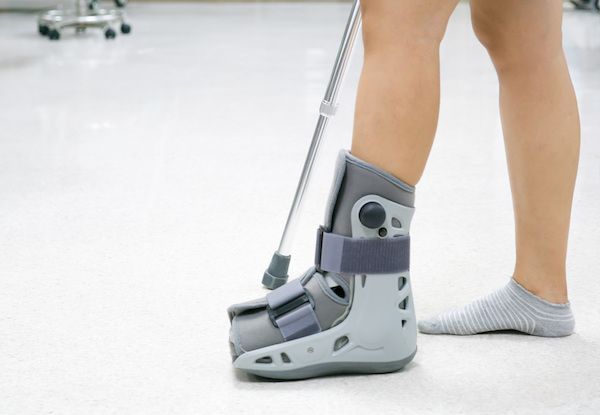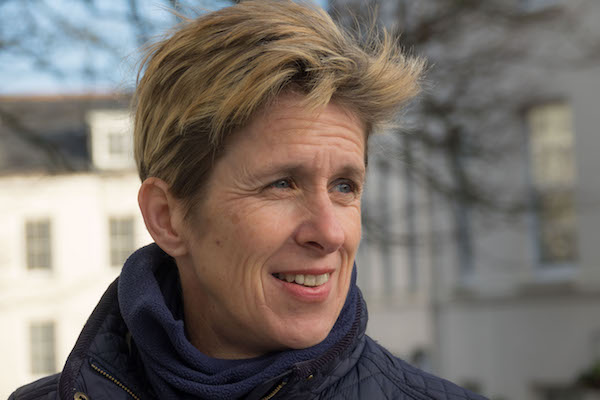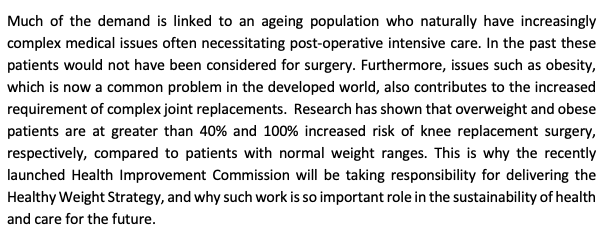

Phase two of a plan across the local health sector is being implemented to hopefully cut waiting times for patients needing orthopaedic surgery.
With an ageing populating, Health & Social Care has been under ever-increasing pressure to treat people who need operations on their joints, and then subsequent care as an inpatient.

Deputy Heidi Soulsby, President of HSC, spoke about the wait times in the States today. She said phase two would make a difference throughout 2019.
Under the MSG's contract, patients are only meant to have to wait a maximum of eight weeks to have these elective operations, but that has not been universally possible for a number of years, with 49% of inpatients waiting longer than that at the beginning of 2016, and 53% waiting longer by March this year. Right now, there are six patients who have been waiting for more than 12 months, and 95 waiting for more than six.

An extract from HSC's statement on the initialisation of phase two of its plans. It was previously focused on outpatients, now it will focus on inpatients.
Earlier this year, phase one of the plan saw measures taken to successfully bring waiting times for 'orthopaedic outpatient appointments' back within that eight week time - measures taken included a review of rotas, additional outpatient clinics and a prioritisation process. But, as expected, this increased those inpatient waiting times, so HSC now has to tackle the problem.
Specifically, the committee plans to reduce the backlog through a number of measures:
Using off island partners - "Although throughout much of the UK waiting times are as long, if not longer, than Guernsey’s as the NHS is also experiencing growing demand, we have identified hospitals who are able to support us and a request has been made for additional funding to enable some patients to be treated off-island. In addition, we are working with Jersey to see how they can help us in this area."
Increasing theatre utilisation - "This will include extending operating hours during the week and into weekends. This will require additional theatre teams and a locum anaesthetist, for which funding is being requested. We are working with MSG to schedule additional orthopaedic procedures using the proposed extended operating hours."
Increasing bed capacity - "The recent expansion of medical wards will assist in reducing the times surgical beds are given over for patients who should be cared for on general medical wards. Changes are also being made to De Sausmarez Ward to create designated trauma beds which will reduce the number of cancellations for emergencies."
Using France as provision for certain Operations - "In addition to the above, and in the longer term, we are considering the feasibility of using France for the provision of certain operations in the future. The Committee for Health & Social Care will also be bringing a Policy Letter to the Assembly in March 2019 setting out the programme to modernise the hospital which will include increasing capacity within theatres and the critical care unit."
HSC said it expected these actions to allow them to deliver "significant improvements" to waiting times over the coming year.

St John saw huge demand for its services in 2018, and an increase in demand for emergency and trauma care means more electives need to be cancelled.
Alongside those specific immediate initiatives, HSC has also committed, with the MSG, to review the service in 2019 as part of their Secondary Healthcare Contract Commitments. This will produce guidance for the future of service and generate recommendations.
"The growing elderly population is and will continue to put greater pressures on health care resources, especially in Orthopaedics, which treats a variety of degenerative conditions ," Gary Yarwood, Chairman of the MSG, said.
"The MSG will support HSC as strongly as we can to enhance surgical capacity to meet the rising demand. We have agreed short term initiatives that will significantly increase the number of Orthopaedic operations that we can schedule, whilst longer term we are actively involved in facilitating more permanent solutions, with the intention of keeping pace with rising demand in the future."

Encouraging healthy weights is just one way of trying to tackle people's need for orthopaedic surgery before it arises.
Peter Rabey, States of Guernsey Medical Director, added: "This is a long-term problem that has affected many patients and we are not alone in experiencing this. However, we are doing all that we can to ensure that waiting times come down to an acceptable level as soon as possible. We look forward to working with all our partners to achieve that.”
Demand is certainly increasing as well, as referrals for orthopaedic surgery have increased by 35% in the last five years, and in the last year alone there has been an increase in the number of inpatient referrals by 22%.
As an example of this, in the week ending 25 November 2018, 38 new patients were added to the inpatient waiting list, while 24 were treated.
Comments
Comments on this story express the views of the commentator only, not Bailiwick Publishing. We are unable to guarantee the accuracy of any of those comments.